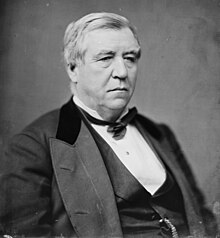John W. Stevenson
| John White Stevenson | |
|---|---|
 |
|
|
United States Senator from Kentucky |
|
|
In office March 4, 1871 – March 3, 1877 |
|
| Preceded by | Thomas C. McCreery |
| Succeeded by | James B. Beck |
| 25th Governor of Kentucky | |
|
In office September 8, 1867 – February 13, 1871 |
|
| Lieutenant | vacant |
| Preceded by | John L. Helm |
| Succeeded by | Preston Leslie |
| 18th Lieutenant Governor of Kentucky | |
|
In office September 3, 1867 – September 8, 1867 |
|
| Governor | John L. Helm |
| Preceded by | Richard T. Jacob |
| Succeeded by | John G. Carlisle |
| Member of the U.S. House of Representatives from Kentucky's 10th district |
|
|
In office March 4, 1857 – March 3, 1861 |
|
| Preceded by | Samuel F. Swope |
| Succeeded by | John W. Menzies |
| 7th President of the American Bar Association | |
|
In office 1884–1885 |
|
| Preceded by | Cortlandt Parker |
| Succeeded by | William Allen Butler |
| Member of the Kentucky House of Representatives | |
|
In office 1845–1849 |
|
| Personal details | |
| Born |
May 4, 1812 Richmond, Virginia |
| Died | August 10, 1886 (aged 74) Covington, Kentucky |
| Resting place | Spring Grove Cemetery |
| Political party | Democratic |
| Spouse(s) | Sibella Winston Stevenson |
| Relations | Great-grandson of Carter Braxton Son of Andrew Stevenson Cousin of Willoughby Newton |
| Alma mater | University of Virginia |
| Profession | Lawyer, Professor |
| Religion | Episcopalian |
| Signature | |
John White Stevenson (May 4, 1812 – August 10, 1886) was the 25th governor of Kentucky and represented the state in both houses of the U.S. Congress. The son of future Speaker of the House and U.S. diplomat Andrew Stevenson, John Stevenson graduated from the University of Virginia in 1832 and studied law under his cousin, future Congressman Willoughby Newton. After briefly practicing law in Mississippi, he relocated to Covington, Kentucky, and was elected county attorney. After serving in the Kentucky legislature, he was chosen as a delegate to the state's third constitutional convention in 1849 and was one of three commissioners charged with revising its code of laws, a task finished in 1854. A Democrat, he was elected to two consecutive terms in the U.S. House of Representatives where he supported several proposed compromises to avert the Civil War and blamed the Radical Republicans for their failure.
After losing his reelection bid in 1861, Stevenson, a known Confederate sympathizer, stayed out of public life during the war and was consequently able to avoid being imprisoned, as many other Confederate sympathizers were. In 1867, just five days after John L. Helm and Stevenson were elected governor and lieutenant governor, respectively, Helm died and Stevenson became acting governor. Stevenson subsequently won a special election in 1868 to finish Helm's term. As governor, he opposed federal intervention in what he considered state matters but insisted that blacks' newly granted rights be observed and used the state militia to quell post-war violence in the state. Although a fiscal conservative, he advocated a new tax to benefit education and created the state bureau of education.
...
Wikipedia
